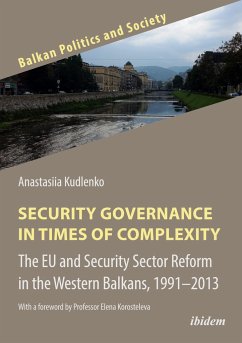
Corporatism and Security Sector Reform
Brazil and Romania in Comparative Perspective, 1985-2002
Versandkostenfrei!
Versandfertig in 6-10 Tagen
32,99 €
inkl. MwSt.

PAYBACK Punkte
16 °P sammeln!
The main objective of the book is to analyse, from across-regional comparative perspective, the relationship between thecorporatist features and civil-military relations in twodemocratising countries, Romania and Brazil. I choose Romania and Brazilbecause these two countries presented peculiar features regarding thecivil-military arrangements within their own regions, and, inaddition, these countries share a particular heritage regarding thecorporatist arrangements both in terms of intellectual-cultural legacy and contingentdecisions. On the one hand, this study aims to provide an answer to th...
The main objective of the book is to analyse, from a
cross-regional
comparative perspective, the relationship between the
corporatist
features and civil-military relations in two
democratising countries,
Romania and Brazil. I choose Romania and Brazil
because these two
countries presented peculiar features regarding the
civil-military
arrangements within their own regions, and, in
addition, these
countries share a particular heritage regarding the
corporatist
arrangements both in terms
of intellectual-cultural legacy and contingent
decisions. On the one
hand, this study aims to provide an answer to the
current appeals
for
new analytical perspectives within the literature. On
the other hand,
the book will survey neglected features of
corporatism and
corporatist elements, namely those regarding the
civil-military
relations and
national security policy in two of the largest
democratizing societies
in
Latin America and post-communist Europe.
cross-regional
comparative perspective, the relationship between the
corporatist
features and civil-military relations in two
democratising countries,
Romania and Brazil. I choose Romania and Brazil
because these two
countries presented peculiar features regarding the
civil-military
arrangements within their own regions, and, in
addition, these
countries share a particular heritage regarding the
corporatist
arrangements both in terms
of intellectual-cultural legacy and contingent
decisions. On the one
hand, this study aims to provide an answer to the
current appeals
for
new analytical perspectives within the literature. On
the other hand,
the book will survey neglected features of
corporatism and
corporatist elements, namely those regarding the
civil-military
relations and
national security policy in two of the largest
democratizing societies
in
Latin America and post-communist Europe.












